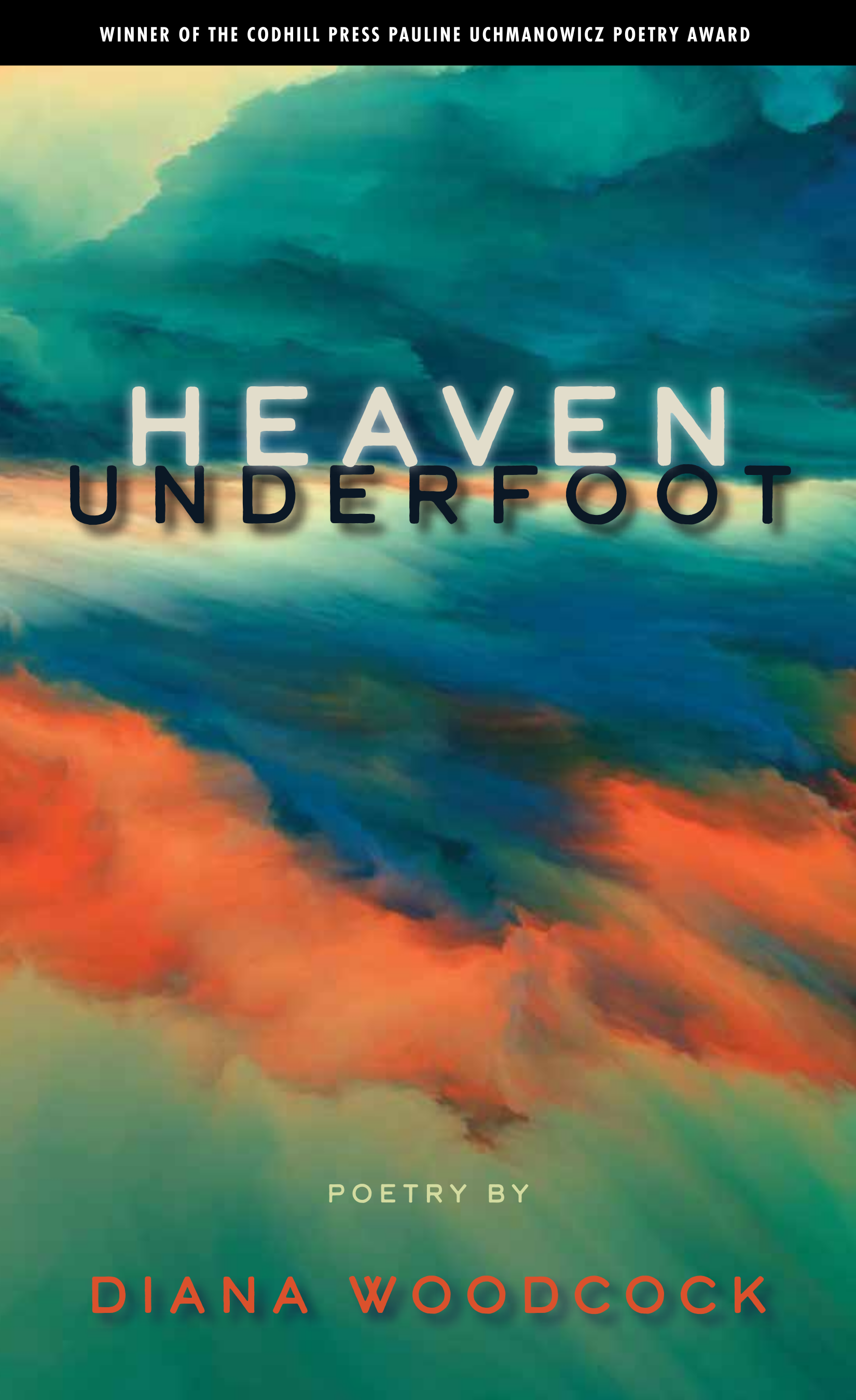Feel the desert trembling with floral presence.
Will it ever be possible once more
to dance on the forest floor? to ignore
the accusing iridescent eye of the dragonfly
or the sound of wadis weeping?
— “Mallows And Rock-Roses” (Heaven Underfoot, Codhill Press, 2023)

© 2024 Diana Woodcock, Ph.D.
Heaven Underfoot
2024 Feathered Quill Book Award Finalist for Poetry
2022 Codhill Press Pauline Uchmanowicz Poetry Award
The speaker of the poems in Heaven Underfoot—by immersing herself in the more than human world of several diverse biomes, from the Arabian Desert to the Everglades, Southern Africa, the Arctic Circle, Great Smoky Mountains, and the Tongass National Forest—has endeavored to make the non-human environment central rather than marginal as she explores and celebrates the sacred within and on this earth.
The ecopoems of Heaven Underfoot exemplify the four features of environmentally conscious texts, which set them apart from nature writing (as outlined by American scholar Lawrence Buell in The Environmental Imagination): they make the non-human environment central rather than marginal; they feature human interest as only one valid focus; they hold humans accountable to the environment; and they portray nature as a process rather than a fixed framework.
Praise
"These poems several times invoke Henry Thoreau, yet Diana Woodcock perambulates much further and in more difficult environments than his. Their formal strengths engage deep delight and concomitant sorrow at the wonders of an imperiled, holy earth. 'One who’s endured aridity . . . turned into pure fluidity' in Arabia’s Empty Quarter takes us along to a sea of islands so far north there is no night; she describes minutest particulars of nature’s processes, observant close-ups of plants and animals in diverse other spots across the planet. Heaven Underfoot allows seldom-seen fellow creatures, 'many weird/names and shapes,' on an 'Earth/still being created' to be our intimates. This book is a pilgrimage of attention, of caring."
—Mary Gilliland, author of The Ruined Walled Castle Garden and The Devil’s Fools
"In Diana Woodcock’s Heaven Underfoot, we find a beautiful marriage of scientific fact, social understanding and lyric image. This book travels the world with eyes wide open and a generous heart—Africa, Cambodia, the Arabian Desert, the Arctic, the Great Smoky Mountains, the Everglades—and everywhere it goes, it names the world with specificity and music. While acknowledging the imperfection of a human inhabited world, these poems remain awash in gratitude and wonder. They invite us to participate in that wonder and, along with the poet, to 'give thanks all day / For the rapture and despair, / For all that is missing / And all that’s still there.'"
—Anne McCrary Sullivan, author of Notes from a Marine Biologist’s Daughter
"Diana Woodcock’s sixth book of poems, Heaven Underfoot, celebrates the immeasurable abundance, beauty, and strangeness of earth’s creatures in various parts of the world where she lives or has traveled: the Arabian Desert, southern Africa, the Svalbard Peninsula, Florida’s River of Grass, the Great Smoky Mountains, the Tongass. Her immersion in and intimate knowledge of the other-than-human world make the book a rich pleasure. There’s 'so much we can’t know,' she writes; yet, 'becoming overwhelmed by a sense of your own insignificance, you find it liberating, intoxicating; you feel, for the first time in the longest time, utterly at peace here in the midst of wild things.' And in the poem 'Put All America Behind You,' she sounds an urgent note about the environmental peril of our times: 'Wander and wonder / on [earth’s] rich mosaic—let her fill in / the gap and bring you back / from the dark brink.'"
—Ann Fisher-Wirth, author of Paradise Is Jagged and The Bones of Winter Birds, coeditor of The Ecopoetry Anthology and The Ecopoetry Anthology: Volume II (Trinity University Press, 2025)
To Order
Bibliographic Information
- isbn 9781949933253
- pages 86 pp.
- format 5.5 x 9" paperback
- publication date November 1, 2023
- publisher Codhill Press
Table of Contents
- prologue
- And Ever Thanks
- Rub’ al Khali
- Arabian Desert Autumn
- Dugong
- Camel Spider
- Golden Jackal
- Forktail Needlefish
- Landforms—Wadis and Runnels
- Warning—Danger
- Mallows and Rock-roses
- Sedges
- Rejection, Rock Dove-style
- Sonnet for an Arabian Autumn
- Southern Africa
- First Bush Camp, Zambia
- Swept Away
- Dusk on a Pristine Flood Plain
- If This Is Just a Dream
- Flap-necked Chameleon
- Svalbard Archipelago
- Svalbard Fossils
- Arctic Marine Ecology
- Light of the Midnight Sun
- Isfjorden, Day Two
- Little Auks Near the Arctic Circle
- River of Grass
- Last Breath
- Mahogany Hammock
- First Sunset, Anhinga Trail
- King of Infinite Space
- Green Heron
- Grassy River
- Edge of a Sawgrass Prairie
- Postcards from the Everglades
- I Went with Only One Intention
- Shaconage
- Roaring Fork
- Triptych of Low Mountain Cove (Cades Cove)
- Becoming Smooth
- Stoking Hope’s Last Ember
- Tongass National Forest
- Manzanita Island
- Five Species of Salmon
- In the Spray Zone of Waterfalls
- Lichen Connection
- Half-Earth
- Meditation on Active Volcanoes
- Becoming a Cormorant
- Ta Prohm Temple, Angkor
- Put All America Behind You
- How to Feel Small
- Epilogue
- I Give Thanks All Day
- Acknowledgements
- Notes
- About the Author
Keywords & Interest Areas
- Ecology
- Ecopoetry
- Nature
- Global Warming
- Climate Change